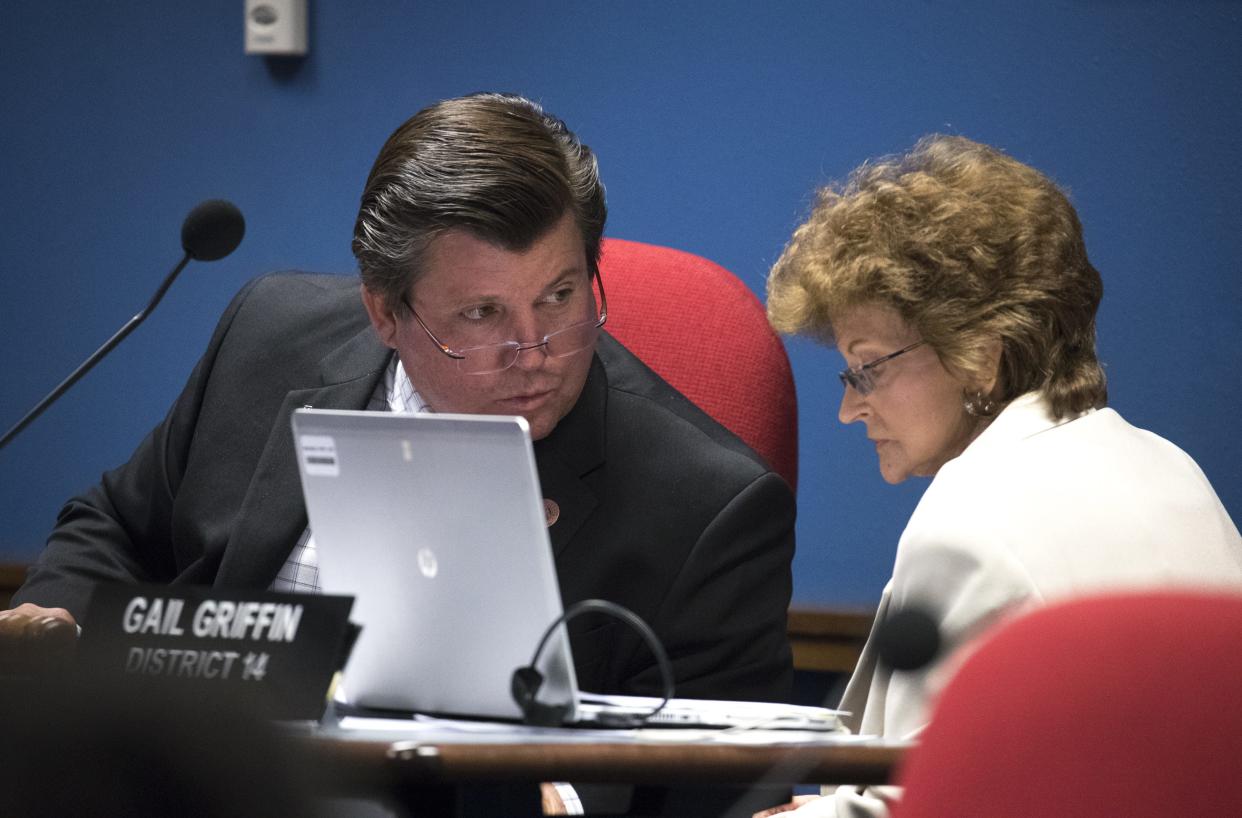Arizona is leaving its water future to the whims of a single lawmaker

- Oops!Something went wrong.Please try again later.
There’s a lot of gnashing of teeth about the close partisan split in the Arizona Legislature.
Some grumble that it turns one or two Republicans into the emperor, forcing legislation to live or die by their thumbs up or down.
Yet while many indications suggest that next year’s Legislature will become redder, water policy is still likely to live and die by one lawmaker – Republican Rep. Gail Griffin, who chairs the House’s natural resources committee and who is notorious for killing any water bill with which she disagrees.
In fact, observers believe that Griffin’s grasp on water policy could grow even stronger because of the massive amount of turnover in the House. A lot of new faces will be there, no matter whom voters elect. And water policy is complex. It can take years for lawmakers to really understand how it all works.
No one questions, goes around Griffin
Yet despite polling that suggests voters see water as a priority, only a handful of candidates seem poised or interested enough to make water a cornerstone issue.
Presuming that doesn’t change, next year’s lineup will probably just defer to whatever Griffin says or does.
Some groups – particularly the agricultural interests that have fought a years-long effort to create Rural Management Areas – might consider that a good thing. Griffin deeply believes that any efforts to manage groundwater should be strictly voluntary. Efforts to ratchet up regulations almost never see the light of day in her committee.
Plus, Rep. Regina Cobb, who spent years pressing the Rural Management Area concept (and the rare lawmaker who attempted to go around Griffin, albeit unsuccessfully), is leaving at the end of this session.
No other lawmakers have publicly committed to take up Cobb’s fight.
Killing ideas without debate leads to inaction
But the state’s water situation is growing markedly worse. Water levels at Lake Mead, which supplies about 40% of Arizona’s water, are plummeting. Finite groundwater supplies are declining in many areas of the state. Wells are running dry. People are building homes without access to water.
And while voluntary actions are certainly preferable to address these issues, it’s becoming painfully clear that relying on the good intentions of others isn’t enough to make a dent.
Even if Griffin and others succeed this session in creating a $1 billion Arizona Water Authority to help fund augmentation and conservation projects, that will only address part of the problem (and probably still won’t move the needle for many rural areas with dwindling groundwater, because few rural water providers have the customer base to pay back the loans the authority would offer to build these projects).
It’s past time for lawmakers to engage in some tough conversations on the ground rules for water use – the conversations that are perennially snuffed out by Griffin in her committee.
That doesn’t mean the Legislature should blindly pass bills, like Cobb’s Rural Management Area plan, that for years have been DOA.
But we’re only hurting ourselves if lawmakers keep putting off the conversations that those and other bills would spur. Tamping down every idea Griffin dislikes doesn’t lead to alternatives or better solutions; it just leads to inaction – which only makes the options tougher when dry taps force us to act.
Water requires compromise, even among lawmakers
Most Republicans who have taken an interest in water – including Rep. David Cook, House Speaker Rusty Bowers, who is running for Senate next year, and Sens. T.J. Shope and Sine Kerr, who chairs the Senate’s natural resources committee – generally align with Griffin, particularly on rural water issues.
There is no go-to urban water expert in the House or Senate. And while Democrats like Reps. Andrés Cano and Sarah Liguori or Sens. Morgan Abraham and Rosanna Gabaldón are asking great questions, they also lack the numbers to compel legislation to be heard.
That’s not a call to silence Griffin or find someone else to chair the committee. No other lawmaker works harder to represent a certain viewpoint on water.
I admire her resolve and hard work.
But it is a call for whoever is elected this fall to make getting educated on water – and considering a more diverse set of potential solutions – much more of a priority.
Arizona is facing a water future where even the best outcomes will require sacrifice and compromise. A future where cities, farmers and everyone in between will be asked to swallow bitter pills for the good of the state.
The next governor, House and Senate will set the tone for these efforts. Which is why now, more than ever, we need all perspectives represented and all ideas on the table.
Reach Allhands at joanna.allhands@arizonarepublic.com. On Twitter: @joannaallhands.
If you love this content (or love to hate it – hey, I won't judge), why not subscribe to get more?
This article originally appeared on Arizona Republic: Arizona cannot leave its water future to just 1 lawmaker

